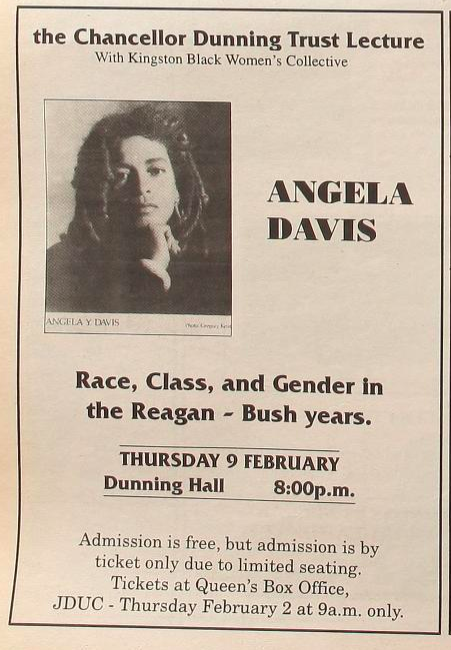
Angela Davis was a prolific American professor and Black activist. During this time, she co-founded Sisters Inside and Critical Resistance. She first gained prominence as a Black nationalist activist during the 1960s, when she became involved in several organizations for Black women. Davis also joined the Black Panthers and the Student Nonviolent Coordinating Committee, and did significant work with the Che-Lumumba Club, an all-Black branch of the Communist Party. In 1970, she was placed on the FBI’s ten most wanted list for her alleged role in a prison escape involving four Black nationalists. She was acquitted of this charge after a trial. From 1980 to 1984, Davis was a professor of philosophy and women’s studies at San Francisco State University, and, at the time of her lecture, was about to release a book entitled Women, Culture and Politics. In 1984, she was hired by the University of California, Santa Cruz, in the History of Consciousness Department. In 1980 and 1984, she ran as the vice-presidential candidate for the Communist Party of the United States. As a prison abolitionist, she has played a major role in the push for criminal justice reforms and other resistance to the prison-industrial complex. She retired from academia in 2008. In the years since, she has continued her work for prison abolition, women’s rights, and racial justice. Her writings include Women, Culture and Politics (1989), Are Prisons Obsolete? (2003), Abolition Democracy (2005), and The Meaning of Freedom (2012). Davis was the first Black woman, and the third woman of colour, to deliver the Dunning Trust lecture.
In her lecture, Davis addressed the setbacks suffered by the civil rights movement during the Reagan administration, and her anticipation for the movement’s future in the new Bush administration. She contrasted the growth of a anti-racist, anti-sexist, and pro-labour majority in the United States with the simultaneous emergence of explosive and violent manifestations of racism, sexism, and classism, especially the rise of crimes against people of colour, women, and queer people. Such outbursts were invited by the Reagan administration, she said, who preferred to pretend racism was a problem of the past. In fact, during the Reagan administration, racism and sexism had been institutionalized to a greater extent than a decade before: the Supreme Court of the United States declared affirmative action in Richmond unconstitutional, Black communities were poorer than ever even as Republicans claimed that the US was entering a new era of prosperity, fewer Black students were entering universities while more were entering the armed forces, and attacks on abortion rights were growing. However, Davis concluded, the era had also seen unheard of collaboration between different progressive movements, creating coalitions that, if nurtured, would continue to address domestic needs and provide solidarity with the struggles of those in other countries. This was, she claimed, the most exciting era in which she had been an activist – the world situation was actively changing, and she was convinced that in her lifetime they would create a new social order in the United States.
Davis’ lecture launched a series of activities organized by the Kingston Black Women’s Collective to celebrate Black History month in the Kingston area. These included a series of workshops at the Kingston Public Library on February 26, including “Race Relations and the Police and Coping with the School System.” Demand for tickets to Davis’ lecture was so high that the venue was moved to the auditorium as KCVI and an additional 400 tickets made available.
Listen to or read Davis’ lecture below.
